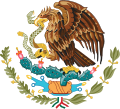Current status
This section needs to be updated. The reason given is: Section’s last statement mentions only the previous Mexican government’s policy, from over five years ago..(September 2025) |
During the Vicente Fox administration (2000–2006), both Ministers of Foreign Affairs, Jorge Castañeda Gutman and Luis Ernesto Derbez, tried to discontinue the Estrada Doctrine, [6] resulting in what was called the Castañeda Doctrine. Under President Andrés Manuel López Obrador, Mexico began to utilize the Estrada Doctrine once more, especially during the 2019 Venezuelan presidential crisis. [7]
